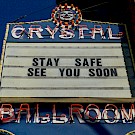 “Help me, help you” is not just what Jerry Maguire says to his star athlete; it’s what promoter and booker Jason Fellman says to every band on his roster. If you want to get your band on the hot bill—or just booked in general—it’s very important to understand the booker’s point of view. Put yourself in his or her shoes and recognize that a booker is always beholden to someone else: the venue, other bands, clients and, most importantly, the audience.
“Help me, help you” is not just what Jerry Maguire says to his star athlete; it’s what promoter and booker Jason Fellman says to every band on his roster. If you want to get your band on the hot bill—or just booked in general—it’s very important to understand the booker’s point of view. Put yourself in his or her shoes and recognize that a booker is always beholden to someone else: the venue, other bands, clients and, most importantly, the audience.
Fellman runs J-Fell Presents and alongside Vortex, we’re working to establish an educational conversation amongst musicians via quarterly panels on the music industry. The next one is on Sunday, April 24 at the Mission Theater and will feature local concert bookers Lori Hughes Killen (McMenamins Music & Events), Eric Gerber (Doug Fir Lounge) and Becky Johnson (Sterling Talent Agency) shedding some light on the music business and how to book shows. The meetup is free and runs from 2 to 5pm.
Before you go, be sure to apply for FauxFest (so our expert panel can review your actual festival submission) and check out these 14 best practices below culled from conversations with our panelists. Then pick the bookers' brains in person!
1. Know Your Audience
No, not your fan base—your booker! Who are you talking to?
All bookers have different needs. Lori Hughes Killen is responsible for booking some 20 spaces across eight McMenamins properties. She’s seeking talent to play smaller rooms as well as acts that can draw to fill bigger ones—both free shows and ticketed events. But because of the variety of spaces, she can take risks with bands at varying stages in their development. With wineries, restaurants, bars and clubs available, many acts have the ability to start small, establish a rapport and reputation, and move up the totem pole, especially if they’re flexible in terms of what they can offer (full band versus duo).
Becky Johnson runs Sterling Talent Agency and books musical acts for clients—from weddings to corporate and private parties to summer concert series. These engagements often come with a great paycheck and an even greater responsibility to deliver. She’s primarily responsible to her clients, not drawing a public audience, so this means her bands must be open to constructive criticism because you’re being hired for a job—not an artistic endeavor.
And Eric Gerber is responsible for packing one of Portland’s most respected clubs: the Doug Fir Lounge. He needs to draw some 200 people on weeknights and sell out the venue on weekends so you better be able to consistently bring that kind of crowd, or create a lineup that will fill the space.
2. Know Who You're Pitching
All three of the above represent very different gigging situations, and all three are looking to support local talent—but it has to be the right fit. First, you must know what you want, and second, you must understand the opportunity you’re seeking so you can properly pitch yourself for the job. For Johnson, “You need to tailor what you do to the audience that you’re after” because you’re being hired as entertainment after all.
3. Organize Your Assets
Have a functioning, updated website and active social profiles, plus organize all of your information into a single electronic press kit (EPK) and have it ready to go at all times. “If it’s taking me more than 30 seconds to access your materials, I’m moving on,” Hughes Killen says.
4. Have Your Music Available Digitally
 “I need to be able to listen to or see the band do their thing,” Gerber says, while Johnson and Hughes Killen prefer live performance videos. “Even if it is rough, it gives me a sense of the energy in room, how fans are interacting, and how versatile the band is,” Hughes Killen explains. All of this stuff better be streaming online (Bandcamp, Spotify, SoundCloud, YouTube) and easily accessible.
“I need to be able to listen to or see the band do their thing,” Gerber says, while Johnson and Hughes Killen prefer live performance videos. “Even if it is rough, it gives me a sense of the energy in room, how fans are interacting, and how versatile the band is,” Hughes Killen explains. All of this stuff better be streaming online (Bandcamp, Spotify, SoundCloud, YouTube) and easily accessible.
5. Craft Your Pitch
First, read the booking submission guidelines listed on the venue’s website. “Bonus points awarded for brevity” reads the Doug Fir’s instructions, while Hughes Killen says, “Tell me the name of your band, we’ve played X, Y and Z, here’s some links to our streaming music and website.”
This email should be short and sweet so ditch the bios—that’s all available on your website anyways, right? “Give me a good reason to book your band,” Gerber says. What materials are recommended?
▶ A brief description of your music (genre, influences, etc.)
▶ Gig history: where you’ve played and the dates
▶ Ticket price, sales and attendance at specific shows
▶ Press: provide links to write-ups within the last six months and relevant to the area
▶ Who else you’ve played with
▶ Contact info: email and phone number
6. Include a Date
“I make an attempt to respond to every single email that has a date,” Gerber says. Being specific gives the booker so much more to work with.
 7. Don’t Send Attachments
7. Don’t Send Attachments
Links only people. If a booker is interested, the links should provide all of the other info necessary.
8. Don’t Call
They’ll call you. All three of these bookers prefer the efficiency of email because, if you pitch according to the recommendations above, they’ll already have the majority of the info they need to book you. Phone calls will come later as the relationship develops and decisions need to be made.
9. Don’t Mail Anything
Bookers are already overwhelmed. “I don’t have time to listen to hard copy CDs,” Hughes Killen says. Never mail anything unless it’s been specifically requested. Save yourself the time and money!
10. Don’t Ask to Join a Bill
At clubs like the Doug Fir, this is “not a good strategy,” Gerber says. Any number of people—the promoter, artist, manager—make the final call. Rather, “the best strategy is to assemble a strong three-band bill” of your own creation, he says.
11. Be Ready to Close the Deal
“I don’t have time to be a babysitter and continually follow-up,” Johnson says. If you take too long to respond, the gig has already been booked. Most bookers want to hear from you within 24 to 48 hours. That doesn’t mean you have to confirm the booking, you just need to touch base and communicate what’s going on.
12. Support the Venue
 Poster by Dan Stiles—click to see an entire gallery of his work“I do not book a date and then step away from it,” Hughes Killen says—and neither should you. Gigs are “a shared partnership” so work with the venue to promote the show. Ask how you can best support already established marketing efforts and respond to requests in a timely manner. Some common expectations the venue might have include:
Poster by Dan Stiles—click to see an entire gallery of his work“I do not book a date and then step away from it,” Hughes Killen says—and neither should you. Gigs are “a shared partnership” so work with the venue to promote the show. Ask how you can best support already established marketing efforts and respond to requests in a timely manner. Some common expectations the venue might have include:
▶ Announce show upon confirmation via website, social media, email blast, etc.
▶ Do not create a secondary Facebook event page if the venue is already handling this; be active on the event page
▶ Provide requested promo materials (photos, bio, video, etc.)
▶ Coordinate with venue to make posters or flyers and distribute them
▶ Provide stage plot (if requested) and be able to customize it
▶ As the date gets closer, remind your fan base of the show
As a local act, “don’t just rely on our marketing arm,” Hughes Killen explains. “Reach out to your fan base and promote your shows. And I expect you to do that more than just the day of.”
Get more marketing tips from local concert promoters here!
13. Be Professional
“Bands and artists need to realize that you are applying for a job—this isn’t any different than sending out a resume,” Hughes Killen sums up.
14. Don’t Give Up!
Finally, don’t take it personally if you’re not selected. It actually says nothing about your talent or draw because bookers always answer to others—bosses, bands and clients. Bookers are also busy so consider diversifying your outreach efforts—don’t wait around for one venue if you’re not getting the answer you need. “Booking is a lot like building a puzzle and sometimes you don’t have the right pieces,” Gerber says.









